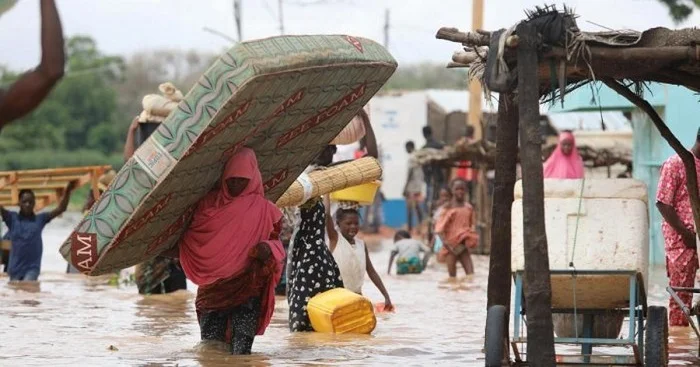A combination of relentless insurgency, rising food prices, and devastating floods has left millions in northeastern Nigeria facing an acute humanitarian crisis. In Borno State, one of the hardest-hit areas, residents are grappling with severe food insecurity and displacement, with no end in sight to their suffering.
The situation took a turn for the worse in September when the Alau Dam, which had been deemed safe by local authorities just days earlier, collapsed. The resulting flood submerged Maiduguri, the state capital, and large swathes of surrounding farmland, further depleting the resources of communities already struggling to feed their families.
Those displaced by the floods are now taking shelter in overcrowded camps, where they depend on emergency food aid. However, supplies are limited, and as stocks run out, many are forced to seek work on nearby farms—only to find themselves at risk of attack by local bandits, who target vulnerable populations.
The crisis in Borno is a continuation of a broader food emergency in Nigeria, worsened by factors such as climate change, inadequate infrastructure, and a weakening national currency. In 2023, torrential rains caused extensive flooding across 29 of Nigeria’s 36 states, affecting more than 9 million people and destroying over 1.5 million hectares of agricultural land, according to the Food and Agriculture Organization (FAO) of the United Nations.
The economic impact of the floods is compounded by soaring food prices. Staple foods like rice and beans have doubled, tripled, and in some cases quadrupled in price, placing an unbearable burden on millions of households. “What we are witnessing is a crisis within a crisis,” said Trust Mlambo, head of the World Food Program’s northeast operations.
The crisis is not limited to the floods. Conflict between farmers and herders in Nigeria’s central region, as well as mass kidnappings in the northwest, have further disrupted food production, causing widespread agricultural decline in the nation’s once-thriving breadbasket. The result is a deepening hunger crisis that is expected to affect 33 million Nigerians by mid-2024, up from 25 million today, according to joint analyses by the Nigerian government and UN agencies.
The World Bank estimates that nearly 40% of Nigeria’s population, over 200 million people, lives below the international poverty line of $2.15 per day. For many, the current crisis has left them with little choice but to beg for food. “I beg for food, not for myself, but for my children,” said one woman from Borno, who has lost everything to repeated flooding and violence.
As Nigeria faces mounting challenges, international aid has been stretched thin, with donors focusing on emergencies in other regions. “We are prioritizing the hungriest of the hungry,” said Mlambo, underscoring the severe shortage of resources needed to address the growing needs in Borno and beyond.
In Borno’s capital, Maiduguri, one woman shared her story of losing her home and livelihood to the flood. She had previously been able to support her family by raising animals for religious holidays, but the flood destroyed everything, forcing her family into a displacement camp. “There is no other option,” she said, reflecting the desperation felt by so many in the region.
With little assistance on the horizon, the people of Borno continue to endure the compounded effects of conflict, climate change, and a fragile economy, facing an uncertain future as the region sinks deeper into crisis.

